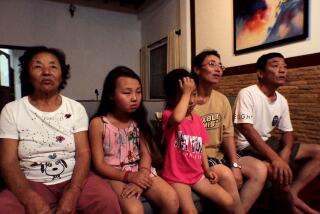GI Receives a 30-Day Sentence for Desertion
- Share via
CAMP ZAMA, Japan — Charles Robert Jenkins, the GI who deserted to North Korea, was given a 30-day sentence Wednesday by a military judge after testifying to four decades of harrowing conditions under the communist regime that were widely acknowledged to be worse than a prison term.
The 64-year-old Jenkins, who frequently burst into tears during his court-martial at this U.S. military camp near Tokyo, said that he was kept in conditions of near-starvation and that the North Koreans removed the U.S. Army tattoo from his forearm with scissors -- without anesthesia.
Jenkins and three other American deserters lived in a one-room house without electricity or water. They spent their time memorizing -- and reciting in Korean -- the propaganda of North Korea’s founder, Kim Il Sung. They were watched constantly by minders and were sometimes forced to beat one another.
“North Korea is led by a man who is evil -- evil to his bones,” Jenkins, speaking through his court-appointed attorney, said of the current leader, Kim Jong Il. And the GI struck a patriotic tone in an appeal for leniency, declaring, “I still love the United States.”
After the hearing, he was whisked to a pretrial detention center at the U.S. naval base in Yokosuka, south of Tokyo, where he will serve his prison term.
“It’s not Club Med, but it’s not a hard labor camp either,” said Capt. King Dietrich, the base commander. “He’ll probably be eating better” than he did in North Korea.
Many in the Pentagon had wished for Jenkins to receive a harsher sentence, but Japanese Prime Minister Junichiro Koizumi’s government pushed for leniency so Jenkins could be reunited with his Japanese wife, Hitomi Soga, who had been abducted to North Korea in 1978 and was released two years ago.
In a deal reached before Wednesday’s court-martial, Jenkins agreed to plead guilty to charges of desertion and aiding the enemy in return for a token appearance in a prison. The military judge, Col. Denise Vowell, who was flown to Japan from Arlington, Va., agreed after hearing the evidence that Jenkins was entitled to clemency.
Under military procedure, it is possible that he will be released before he serves the full 30 days. At the end of the term, he will be dishonorably discharged and lose all possibility of receiving military benefits.
Dressed in his U.S. military uniform, Jenkins spent the day in a wood-paneled courtroom, at times testifying in a deep North Carolina drawl, and at other times having his attorney, James Culp, read a statement.
Offering his first explanation of his desertion on Jan. 5, 1965, Jenkins said he had been depressed and fearful about his service at the demilitarized zone and about the prospect of being sent to Vietnam. Drinking heavily at the time, he mistakenly believed that if he escaped to North Korea, he would be able to make his way home to North Carolina.
His testimony was as revealing about life in North Korea as it was about himself, and some of it was surprisingly comical, especially when it came to the exploits of the four deserters.
Jenkins said that in 1966, the four evaded their minders and went to the Soviet Embassy in Pyongyang, the capital, to request political asylum. They were admitted by the North Korean guards who thought they were Russian, but then kicked out when they were discovered to be Americans.
“I don’t know why they didn’t shoot us.... We longed to leave that place so much that every day we began to take chances. We hoped that we would get caught and that would be the end,” Jenkins said.
On another occasion, Jenkins and the others found a stash of tape recorders and microphones in their house that their North Korean minder was using to record their conversations.
One of the group, Jerry Parish, buried the equipment, telling the minder that he would return it only if he were allowed to go to Pyongyang to buy a bottle of wine. Fearful of getting in trouble, the North Korean relented.
The Americans were held virtually incommunicado, unable to write to their families, listen to anything other than official North Korean radio -- although Jenkins secretly tuned in to the BBC and Voice of America. He said he was so thrilled when he received a copy of James Clavell’s novel “Shogun” that he read it 20 times.
Life improved for Jenkins in 1980 when he was moved to a home of his own in Pyongyang and introduced to Soga, who just 38 days later would become his wife.
Soga testified Wednesday that their marriage had been more or less arranged by the North Korean government, but that they soon came to love each other and were united by their hatred of the regime.
She said she urged her husband not to do anything that would anger the North Korean government, especially after their two daughters were born.
Jenkins concurred that he stopped resisting the North Koreans out of love for his wife.
“My wife told me if I would just shut up, the North Koreans would let us live,” he said.
More to Read
Sign up for Essential California
The most important California stories and recommendations in your inbox every morning.
You may occasionally receive promotional content from the Los Angeles Times.










